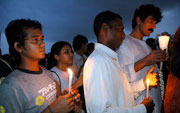 The 9/11 terrorist attacks led to the expansion of national counterterrorism legislation and policies, and many of these new laws circumvented civil liberties. In some cases, they criminalized non-violent activity such as slander of public officials or disturbances of public order. As a result, human rights groups mobilized in response.
The 9/11 terrorist attacks led to the expansion of national counterterrorism legislation and policies, and many of these new laws circumvented civil liberties. In some cases, they criminalized non-violent activity such as slander of public officials or disturbances of public order. As a result, human rights groups mobilized in response.
But lost in this advocacy has been the rights of the victims of terrorism. The human rights community has done little to address this issue.
On September 19th, the United Nations hosted the Symposium on International Counterterrorism Cooperation. Here, Ben Emmerson, the new UN Special Rapporteur on the Protection and Promotion of Human Rights and Fundamental Freedoms While Countering Terrorism, announced that he would continue the work of his predecessor, Martin Scheinin, while also “ensuring that proportionate attention is paid to the rights of victims of acts of terrorism.”
Mr. Scheinin, who served from 2005 until July of this year as the first Special Rapporteur on Human Rights and Counterterrorism, focused almost exclusively on ensuring that states’ counterterrorism policies complied with international human rights law.
A new focus of the agenda of the UN Special Rapporteur might begin to rectify the imbalance between respect for civil liberties and the rights of the victims of terrorism.
Key Conclusions
Today, it is not just the state that can violate the rights of its citizens, but also non-state actors such as Al Qaeda. Targeted civilians are deprived of their most basic right to life and are forced to live in an environment of fear that makes realizing economic, social, cultural, civil and political rights difficult.
As the 2006 UN Global Counterterrorism Strategy highlights, recognizing the rights and defending the dignity of victims is not only a responsibility of states; it is also essential to an effective response to terrorism. By empowering victims of terrorism to tell their stories, the weaknesses of the narratives of terrorists—who often harm those they claim to be fighting for—are exposed, thereby undercutting support and building opposition to terrorist groups.
However, the success of the UN to support victims of terrorism and to condemn terrorism effectively will depend on its ability to create a common language for the issue in human rights terms, coordinate the relevant bodies to work on this issue, and engage with governments and civil society.
Analysis
As international law professor Karima Bennoune has argued, by taking only a defensive posture against the state, the human rights regime has neglected to build an effective response to terrorism as a gross violation of human rights. As of today, the UN has taken some actions to highlight victims of terrorism, but these have not gained significant traction.
For example, in September 2008, UN Secretary-General Ban Ki-moon recognized the need to support the victims by bringing them together with governments, experts, and civil society for the first time on a global level. A report from the symposium developed plans to focus on supporting victims of terrorism, and a Working Group was formed on the issue in the multi-agency UN Counter-Terrorism Implementation Task Force (CTITF).
This Working Group on Highlighting Victims of Terrorism is preparing a report on best practices on supporting victims of terrorism (the report is delayed but forthcoming). And members of the Working Group have brought the issue into their own respective mandates. For example, the International Civil Aviation Organization created the International Civil Aviation Compensation Fund to provide compensation to victims. And with Mr. Emmerson’s commitment, there is a greater role that could be played by the Working Group and the CTITF more broadly to find a common language within the UN to identify how relevant UN agencies can work together to create a unified response.
There are also opportunities for increased engagement with civil society. Civil society is well positioned to give voice to the stories of the victims of terrorism as a means of countering the violent narratives of terrorists. The renewal of the Counter-Terrorism Executive Directorate of the Security Council’s Counter-Terrorism Committee (CTC) last December also offers opportunities for partnership.
While the Security Council has tended to focus more on operational issues of combating and preventing terrorism, the CTC gives greater consideration to the protection of human rights due to the advocacy of the UN Office of the High Human Commissioner for Human Rights and other human rights groups. There is also a potential for the Security Council to play a greater role in addressing the rights of victims if the Council is able to overcome the objections of several of its members to engagement with civil society on this issue. This was recognized most recently at the civil society side event on the tenth anniversary of the establishment of the Counter Terrorism Committee on September 28th.
Just like all of the UN’s counterterrorism work, truly empowering victims of terrorism and addressing terrorism as a human rights violation will take coordination and a common understanding between the many bodies that can contribute to this effort. Mr. Emmerson’s commitment to the rights of terrorist victims is an opportunity to address this shortcoming in the UN’s response to terrorism.
Photo credit: Lakshman Anand




